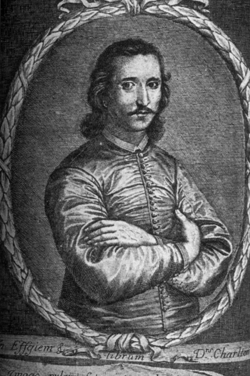- Walter Charleton
-
Walter Charleton (February 1619 – c. April 1707) was an English writer. According to Jon Parkin, he was "the main conduit for the transmission of Epicurean ideas to England".[1]
Contents
Life
He was the son of the rector of Shepton Mallett in Somerset, where he was born 2 February 1619. He received his early education from his father, and when sixteen entered Magdalen Hall, Oxford, under the tuition of John Wilkins. At the early age of 22 (1641) he received the degree of M.D.. and in the same year was appointed physician to Charles I, who was then at Oxford. In 1650 Charleton settled in London, and was on 8 April admitted a candidate of the College of Physicians. A royalist, he was appointed physician to the exiled king Charles II but remained in London writing, in Russell Street, Covent Garden.[2]
He was continued in his office of physician at the Restoration, and was one of the first elected fellows of the Royal Society in 1662; on 23 January 1676 he was admitted a fellow of the College of Physicians. He gave the first lectures delivered in the Cutlerian Theatre in Warwick Lane, in 1680 delivered the Harveian oration, and was president in 1689 and 1691. After his last year of presidency at the College of Physicians, Charleton left London and a dwindling medical practice. He retired to Nantwich; but returned to London, and was senior censor in the College of Physicians from 1698 to 1706, and delivered Harveian orations in 1702 and 1706, when he was also appointed Harveian librarian. He died 24 April 1707.[2]
He had in early life read much in Van Helmont, and spent time in reading and composition, rather than with patients. Thomas Hobbes, Lord Dorchester, Sir Francis Prujean and George Ent were his friends.[2]
Works
He was a copious writer also on theology, natural history, and antiquities, and published Chorea Gigantum (1663) to prove that Stonehenge was built by the Danes. Charleton claimed it was used by them as a place of assembly, and of the inauguration of kings. The only argument is that similar stone works exist in Denmark, a fact supplied to Charleton by the Danish antiquary, Wormius, with whom he had corresponded on the book of Inigo Jones in which Stonehenge is said to be a Roman temple. The Chorea Gigantum had a poem by John Dryden written in its praise, the Epistle to Dr. Charleton, prefixed to the presentation copy given to the king.[2]
He was one of the "character" writers, and in this kind of literature wrote an essay A Brief Discourse concerning the Different Wits of Men (1675).
Works
- Deliramenta catarrhi (1650)
- The darkness of atheism dispelled by the light of nature (1652)
- Physiologia Epicuro-Gassendo-Charletonia: or a fabrick of science natural, upon the hypothesis of atoms (1654) largely based on the 1649 Animadversiones of Pierre Gassendi
- Epicurus's Morals (1656)
- Natural History of the Passions (1674) previously believed to be based on Jean-François Senault De l'usage des passions (1641)
- The harmony of natural and divine laws (1682)
Notes
References
- Emily Booth (2005) A Subtle and Mysterious Machine: The Medical World of Walter Charleton (1619–1707)
- Attribution
 This article incorporates text from a publication now in the public domain: "Charleton, Walter". Dictionary of National Biography. London: Smith, Elder & Co. 1885–1900.
This article incorporates text from a publication now in the public domain: "Charleton, Walter". Dictionary of National Biography. London: Smith, Elder & Co. 1885–1900.- This article incorporates text from a publication now in the public domain: Cousin, John William (1910). A Short Biographical Dictionary of English Literature. London, J. M. Dent & Sons; New York, E. P. Dutton.
External links
Categories:- British ornithologists
- English philosophers
- Fellows of the Royal Society
- Naturalists
- 1619 births
- 1707 deaths
- Alumni of Magdalen Hall, Oxford
Wikimedia Foundation. 2010.

